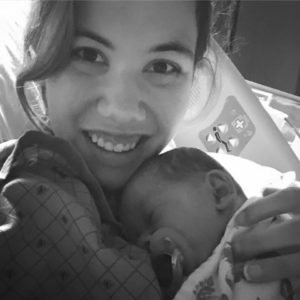Lydia

Disclaimer: The following article mentions the topic of suicide or other sensitive subjects, which may trigger negative thoughts and feelings for those currently suffering or still recovering from a mental or mood disorder. Reader discretion is advised.
Postpartum Psychosis only impacts a small percentage of moms, so it isn’t always very
well understood. One of the scary symptoms of Postpartum Psychosis is wanting to
harm your child. It also involves hallucinations, suicidal ideations, not feeling like your
baby is your baby, and more. The word “scary” pretty well sums up my experience.
There were lots of things that contributed to me developing Postpartum Psychosis. I
have a family history of schizophrenia on both sides of my family. My delivery didn’t go
well. I was induced for preeclampsia; I had a UTI (also known for causing psychosis),
and after two hours of pushing, an emergency C-section was performed.
Throughout my experience, I remember my mind racing all the time. When I was able to
sleep, I’d have vivid nightmares and was terrified of my baby being harmed, killed, or
accidentally dying. Even when he was sound asleep, the echoes of him crying filled my
ears.
It all came to a head about two weeks postpartum. After only one or two hours of sleep,
I woke up to tell my mother-in-law that Jesus was coming. When my husband learned
I’d also been having auditory hallucinations, we went to the ER. From there, I was
admitted to the behavioral health unit for a week.
The delusions lasted for a while. I had medication problems that resulted in a second
hospitalization. It took about 6 months to find medication that made me feel somewhat
like myself.
I had incredible family members that stood by me and a remarkable church community.
I had neighbors who would come over and do my laundry. My mother-in-law helped with
meals. Friends offered to babysit so I could go to therapy appointments or sleep.
It took a long time to get back to some semblance of normalcy. I’m not sure things will
ever be like they were pre-baby, but it’s made me stronger, more empathetic, and more
capable of making a difference in the world of maternal mental health. I now work in
mental health helping women who also struggle with acute mental health challenges.
My dream is to become an LCSW so I can help women of all different circumstances
navigate the transition into motherhood.
If you or someone you know is struggling, I want to add my witness that recovery IS
100% possible. I’ve not only experienced it, but I also get to see it in my current job.
Yes, it will take time and twists and turns before you reach “normalcy” again, but that
hope for normalcy is not in vain. You can have a happy and healthy life once again.
